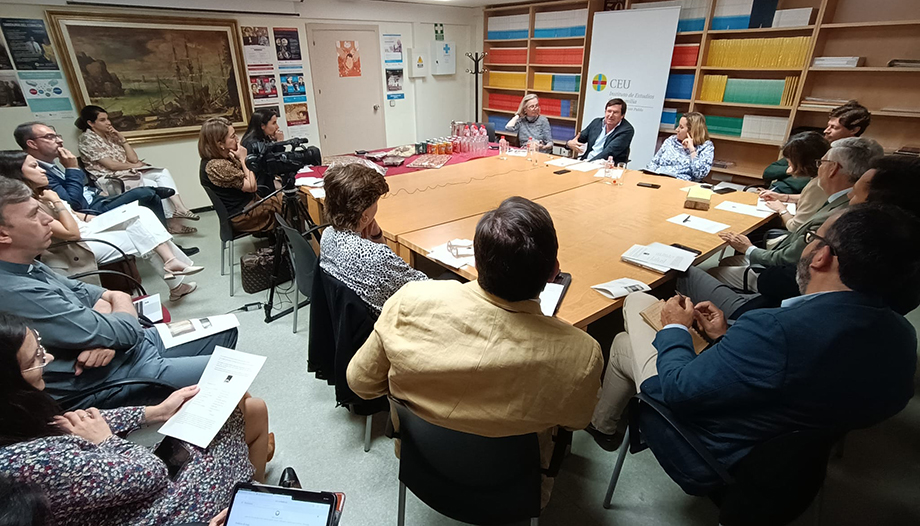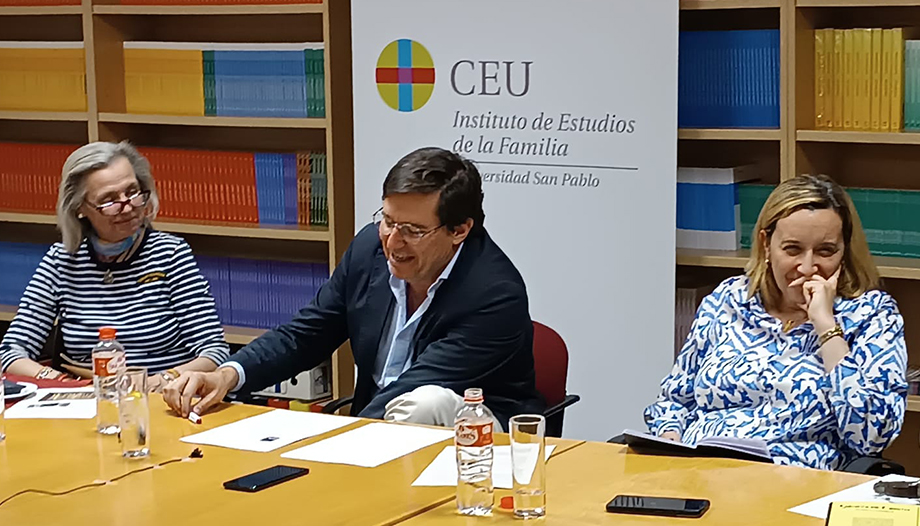When Emperor Marcus Aurelius reflected on the inheritance he had received, he did not think of money. "From my grandfather Vero I inherited an affable character (...) From my mother, on the other hand, religiosity and generosity", wrote the philosopher ruler. 2,000 years later, the poet, columnist and professor Enrique García-Máiquez invoked the memory of the Roman in Madrid: "I ask my students to do the same: the affable character of your grandfather is an inheritance worthy of an emperor".
García-Máiquez outlined on Wednesday this idea about virtues as imperial inheritance during the fifth and last session of the cycle of conferences 'The family. Heiress and transmitter', organized in the CEU San Pablo University by the CEU Family Institute. The author of Verbigracia or the recent Grace of Christ defended in his speech that the family is "the primordial cell of the nobility of spirit".
Introduced by the academic secretary of the institute, Carmen Sánchez Maíllo, García-Máiquez stated that in today's society there is a nostalgia for nobility of spirit, and pointed out the lost opportunity of democracy: paraphrasing Chesterton's famous phrase about the Duke of Norfolk, he regretted that "today we could all be aristocrats, but we are not".
All families are aristocracy
He is also a contributor to media such as Vozpópuli o The Debate acknowledged that the term "aristocracy" can raise suspicions, but defended its use against synonyms such as "elite", "exemplarity" or "rules for living well", used by other authors. "To speak of aristocracy," he said, "has several advantages: it has a great literary tradition, it takes advantage of a nuclear energy of the soul such as vanity... but, above all, it places the accent on family transmission, on the debt to our elders.
In this sense, García-Máiquez urged the recognition of all aristocracies, from blood or military aristocracies to "the lineages of cattle breeders or potters". "We have to study which aristocracy is our family," he challenged, and insisted on the need to highlight the family tradition, through customs, photos or stories of what the ancestors did. He also charged against vulgarity: "Manners make the gentleman", he recalled, recounting his sisyphean struggle for his daughter to use her fork properly.
The speaker recalled the need to defend one's own heritage, both the material - "without a minimum of economic comfort you cannot be educated," he said- and the immaterial: "We must be aware that by transmitting the great Western heritage we are giving a treasure to our children; having a copy of Don Quixote at home is like having the Meninas!
García-Máiquez concluded with a chivalrous call to arms, because "part of the nobility of spirit implies entering the fight". For the poet, three fronts are open to the family today, starting with fatherhood. "The great dividing line, say the studies, will be between families with fathers and families without fathers," he said, and described two other fronts: the extended family - "children must be given cousins, and second cousins and third cousins!" he exclaimed - and idleness.
"The house must be a place of celebration: I encourage you to baptize your children with seven and eight names, and celebrate all the saints!" he recommended, festively.

The family, heir and transmitter
García-Máiquez's speech concluded the annual cycle of conferences of the CEU Institute of the Family, linked to the Catholic Association of Propagandists (ACdP), which this year had as its theme 'The family. Heiress and transmitter'.
The poet from Cadiz was preceded in the cycle by Nicola Speranza, secretary general of the Federation of Catholic Family Associations of Europe (FAFCE), who warned in April that "ideology has fully entered the European Commission".
In previous months, the program also featured the participation of the director of the CEU Abat Oliba Spínola School, Jordi Cabanes, who defended that "the best education is based on Christian anthropology," and the president of the Association of Large Families of MadridHe criticized the Family Law: "They legislate with sentiment and ideology," he lamented. The cycle was opened by the director of the CEFAS CEU centerElio Gallego, who reflected on the family as the foundation of freedom.








